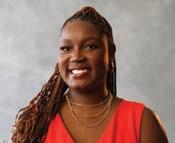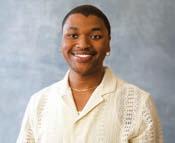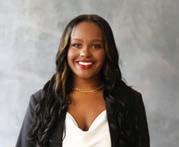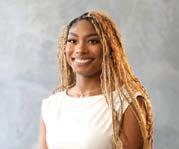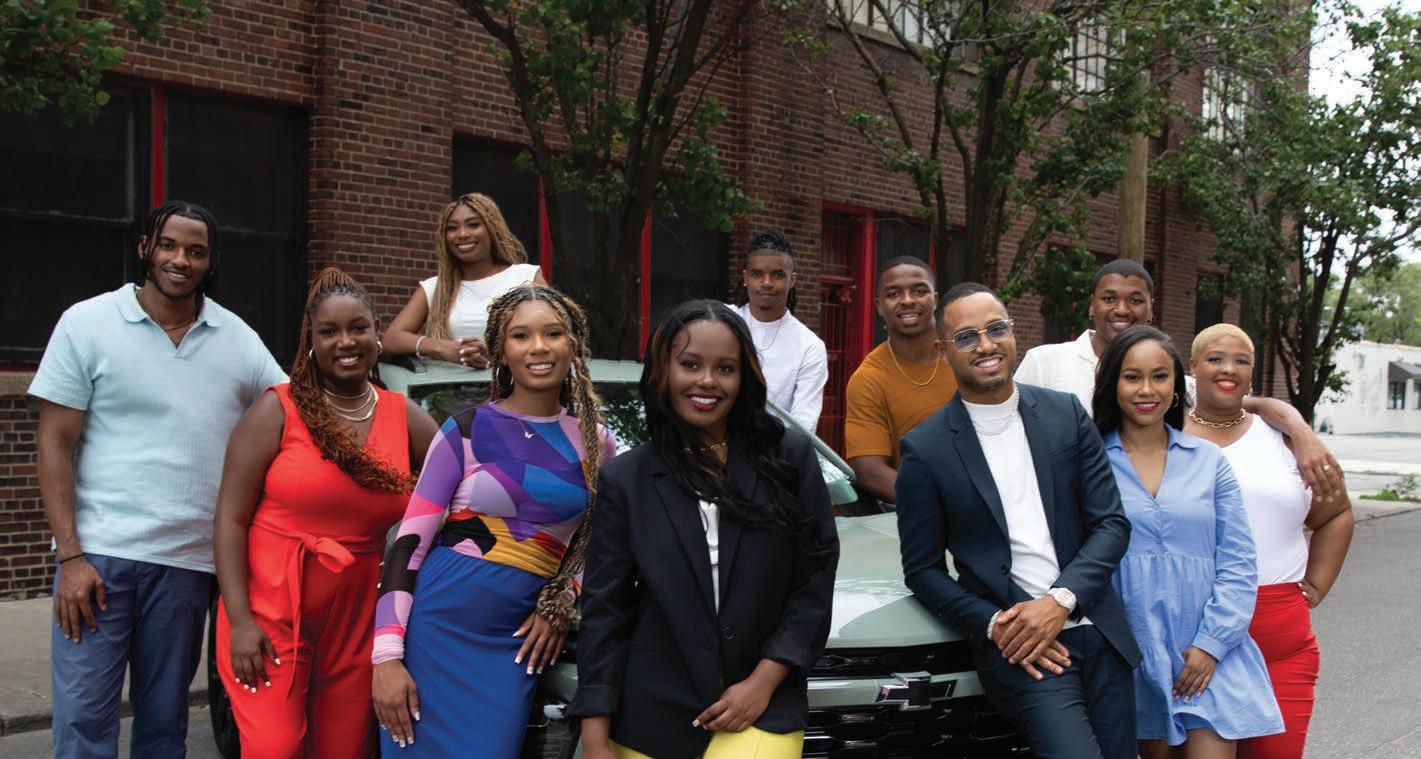






BY LAURA NWOGU
Over 125 Black-owned restaurants across the metro Atlanta area are celebrating as Atlanta’s Black Restaurant Week presents its eighth annual campaign in the city from Aug. 4- Aug. 18. What began as a one-city stop in Houston has grown into a culinary showcase that aims to provide marketing opportunities to minority business owners and highlight the diversity of Black culinary cuisine across the country.
As a Morehouse College graduate, co-founder Warren Luckett understood just how entrenched and influential Black culture is in Atlanta. When people think of Southern cuisine, specifically Atlanta, it may dredge up thoughts of wings and soul food. However, Luckett knew that the city’s culinary offerings went way beyond that.
“What we find during Black Restaurant Week is that there's so much more than that. You have stories of people who have come from all over the country, with Atlanta being such a transient city,” Luckett said. “We aren't monolithic. We create the best food and really every different facet of all the different cuisines. When you talk about Caribbean, African, and even Black American [cuisine], there are many similarities, but they are so different.
“Our goal is to showcase the diversity across the diaspora.”
Black Restaurant Week was founded in 2016 by Luckett and managing partners Falayn Ferrell and Derek Robinson. Amid civil unrest after 18-year-old Michael Brown was shot and killed by a police officer in Ferguson, Missouri, he said they wanted to create a platform that could create conversations around navigating the tragedy and uplifting the Black community.
“Growing up, the dinner table was always a safe place for us where we could discuss politics, and religion. And for us, we were hoping to use food as that medium to bring the community together. And so, our goal for Black Restaurant Week is to drive awareness of these amazing businesses and to drive revenue to the small business owners.”
The campaign is celebrating its biggest year yet, with restaurants from Downtown Atlanta to Decatur and College Park participating. They’ve curated a list of Black-owned businesses, including brick-and-mortar and food trucks, to support, making it easy for locals and visitors to find places moving the needle forward in the Atlanta dining scene.
One of those spots is College Park’s Nouveau Bar and Grill, owned by Ebony Austin. On Tuesday, samples of the restaurant's staple shrimp and grits were plated for groups of lucky patrons who’d been bussed down to the lively restaurant thanks to a partner-
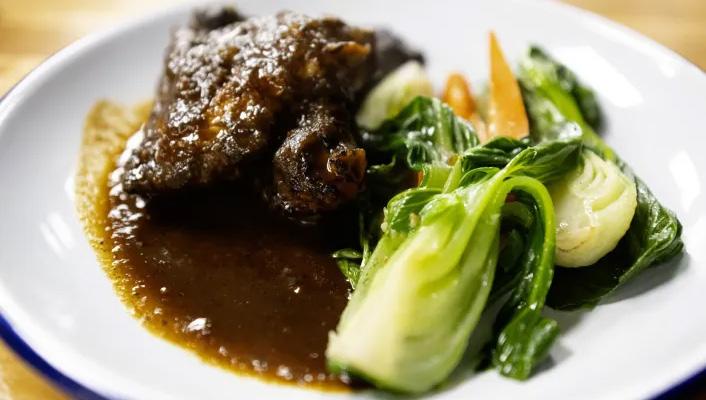
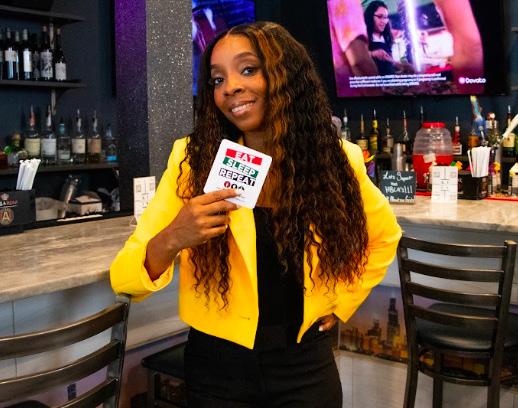
ship with the ATL Airport District. This is the second year in a row that Austin has been involved with Atlanta’s Black Restaurant Week, and as a restauranteur who is big on philanthropy herself, she said it’s something she’s proud to be a part of.
“Think about the regular Restaurant Week and all of the attention and the spotlight that
comes from them. But now imagine what it looks like for us building our own community and food,” Austin said. “And I think that that's the win for us as Black restaurant owners. To be able to go and see the signs that say Black Restaurant Week for restaurants that don't have the money to pay for advertising … I think it's definitely a help and it goes far-
ther than [Black] Restaurant Week and actually begins to bring customers; they begin to be your repeat customers.”
While the restaurant industry regularly has its ebbs and flows, the past four years have been particularly hard due to the lasting effects of the COVID-19 pandemic. During the height of the pandemic, Luckett and his team made sure to provide restaurateurs with online marketing tools to help them pivot as the face-to-face model they knew was one they could no longer rely on. And pivot they have, with some of Luckett’s favorite success stories being those of businesses going from serving food out of a food truck to celebrating the grand opening of its first brick-and-mortar.
“We like to think that we're just a small part. The real joy and the real celebration is the hard work that these operators do day in and day out. They're really the unsung heroes, and we just want to shine a light on them.”
Luckett emphasized that Black Restaurant Week doesn’t have to be regulated to these few days out of the year. Outside of these two weeks, they also have Feed the Soul, a nonprofit foundation that provides business development opportunities, business grants and consulting for small business owners. He also encouraged people to use their online directory year-round as a resource for their Black dining experience.
For a full directory of the restaurants participating in Atlanta’s Black Restaurant Week, visit Blackrestaurantweeks.com

BY DONNELL SUGGS
Georgia Senator Jon Ossoff, in his trademark suit without the tie, walked over to a position in front of the new Ebenezer Baptist Church, where a group of people were waiting. Among the people waiting were school-aged Black children on a field trip, former U.S. Ambassador to the United Nations and Atlanta Mayor Andrew Young, and other local and statewide civil rights leaders.
“I’m here to thank these distinguished civil rights leaders,” Ossoff said as he explained how he got the Federal Prison Oversight Bill, which he first introduced in 2022, passed. The bill was recently signed by United States President Joseph R. Biden.
Following the press conference, Ossoff dropped by The Atlanta Voice office to speak with newspaper leadership about other moves he is making to improve the lives of millions of Black families around the state.
The Atlanta Voice: What makes you want to fight for Black families the way you continue to do in the U.S. Senate?
Sen. Jon Ossoff: When I ran for the Senate, I focussed on health, jobs, and justice. When I think about the challenges faced by Georgia’s African American community, the health disparities in our state are vast, and the gap in economic opportunity and empowerment is vast. The justice gap also remains vast, so I have focused legislative energy, both in terms of oversight and reform efforts and tangible deliverable resources appropriated to the state of Georgia, on addressing those critical gaps.
AV: What has some of that legislative energy wrought?
JO: There’s a huge shortage of facilities and resources for Black Georgians. That’s on the southside of Atlanta, but also in rural communities across the state. That’s why I have appropriated funds, for example, for Southern Regional Hospital. That’s why I appropriated funds to clinics in rural areas in Georgia, as well as to transportation services that help folks in rural and underserved areas get to their appointments, get to the pharmacy, and get what they need.
AV: There is a huge gap between Black and white women in maternal services in Georgia. What’s up with that?
JO: The maternal health gap in Georgia, the racial divide is so extreme. Georgia has been at the bottom of the national rankings, basically last or second to last, in maternal health overall for over a decade. By some measures in recent years, maternal mortality for Black women in Georgia has been higher than maternal
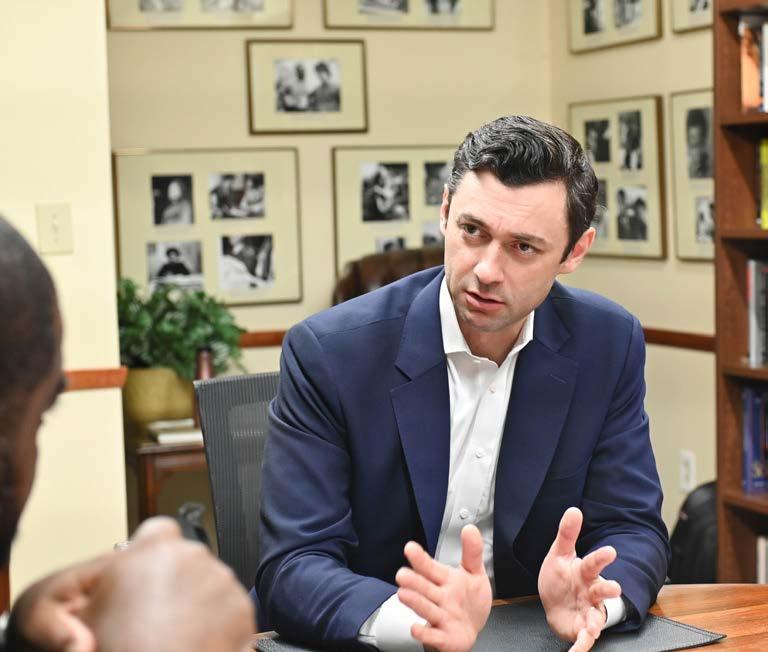

mortality in Iraq, a country that has been in a state of active conflict for more than two decades.
Editor’s note: Ossoff recently held a senatorial hearing highlighting the testimony of OBGYNs and maternal health doctors from Georgia. During the hearing, Georgia’s six-week abortion ban was the main topic of discussion.
JO: We heard testimony about women who were miscarrying who were unable to get health care until they became sicker, sicker, and sicker. We heard testimony about a Georgia woman who had to leave the state, fly to Massachusetts to
get healthcare, lost the pregnancy while traveling, and then, upon arriving in Massachusetts, went into sepsis. The extreme laws in Georgia are criminalizing the practice of obstetric medicine and worsening our shortage of OB GYN doctors in Georgia who provide that vital prenatal care.
AV: Medicaid is very important to millions of American families, and particularly to the state’s Black families, so why do you think it’s not as equally important to some of Georgia’s leaders?
JO: Georgians pay the same federal taxes as residents of every other state in the country, but we are one of just 12 who refuse to get those resources back to help working families access health care. It doesn’t just deprive working families of healthcare, it deprives our hospitals of revenue. Because there being insured patients coming through the door, there are uninsured patients coming through and the hospitals have to foot the bill.
AV : That might be why hospitals like Atlanta Medical Center were so easy to close?
JO: They don’t have an insured patient population because the state still refuses to expand Medicaid. And really, the only reason is that the underline legislation was advanced by former United States President Obama. There are still those lingering petty political grievances over the Affordable Care Act from more than a decade ago. So we have to think about health and, in
particular, maternal health and the health of Black women.
AV: Part of that health is eating right, correct? There are so many counties in this state that aren’t as fortunate to have supermarkets and farmers markets within minutes like we do in Atlanta.
JO: I’m introducing legislation called the Fresh Foods Act to help incentivize grocery stores, whether they are local community family-owned grocers or big supermarkets, to open new locations in underserved areas where they will sell fresh fruits and vegetables. If you’re somewhere there’s no hospital, no health clinic, no grocery store offering fresh fruits and vegetables, the state hasn’t expanded Medicaid, so there’s a lack of access to health insurance, it’s not like it’s a mystery why health outcomes are so much worse.
AV: Why are organizations like Big Brothers Big Sisters of Metro Atlanta, for example, so important for you to get federal funding?
JO: I look at my job as a legislator and I think about it in the context of an entire human life. I thought about how we can focus on mentorship to children and adolescents, so I delivered resources for the organizations that specialize in mentorship, but for organizations here [in Georgia] that are healing place mentors and mental health professionals in schools too.
Editor’s Note: Mentorship and mental health resources, after-school opportunities, community centers, and safe public parks are also things Ossoff mentioned were targets of his funding efforts. “These are all areas where I have delivered resources to upgrade facilities on the southside of town and in rural communities and will continue to do so,” he said.
AV: Lastly, I want to talk to you about the Federal Prison Oversight Act that you helped get to the president’s desk and now into law. How important was that bill to you personally, and to Georgia’s Black families that are so oftentimes most affected?
JO: My political upbringing and my first introduction to public life was working as a very young man for Congressman John Lewis. What’s happening behind bars across the country is a humanitarian crisis. It makes a mockery of the Eighth Amendment of our Constitution which prohibits cruel and unusual punishment.
It is an issue that I care about, it is an issue where I’ve focused oversight and investigative resources. And now with passage of the Federal Prison Oversight Act, we have passed the most significant prison transparency and inspection legislation in many, many years.
“Let nothing dim the light that shines from within.” -Maya Angelou
BY JAMES S. BRIDGEFORTH
In the intricate tapestry of the American economy, one thread stands out not only for its resilience but also for its potential to drive significant economic growth and social change. That thread is the African American economy — a force that not only supports its community but also bolsters the broader economic fabric of the United States.
The narrative of African American economic power is often overlooked or underestimated, overshadowed by persistent disparities and historical injustices. However, to truly grasp the impact and potential of this economic force, one must recognize its depth and breadth across various sectors — from entrepreneurship and consumer spending to workforce participation and investment.
African Americans represent a substantial consumer base in the United States, wielding immense purchasing power that influences industries ranging from fashion and entertainment to technology and healthcare. According to a report by Nielsen, Black consumers collectively have a buying power projected to reach $1.8 trillion by the end of 2024. This economic influence extends beyond mere consumption; it shapes market trends, influences product development, and drives innovation.
Moreover, the entrepreneurial spirit within the African American community is a cornerstone of economic vitality. Historically, Black-owned businesses have played a pivotal role in local economies, fostering job creation, community development, and economic empowerment.
Today, Black entrepreneurs continue to launch enterprises at a higher rate than the national average, contributing to economic diversity and resilience. Investments in education and skills development further amplify the economic impact of African Americans.
As more individuals from this community pursue higher education and specialized training, African Americans contribute to a skilled workforce that drives productivity and innovation across industries. The growing African American presence in professions such as law, medicine, academia, and technology not only enhance these fields but also advance the nation’s overall economic competitiveness.
Furthermore, the economic influence of African Americans extends beyond domestic borders. In an increasingly globalized economy, cultural exports from the Black community — including music, art, fashion, and entertainment — have garnered international acclaim and economic success. These exports not only generate revenue but also promote American cultural influence worldwide, further solidifying the economic footprint of African Americans.
Despite these achievements, challenges persist.

Structural barriers, systemic inequalities, and disparities in access to capital continue to hinder the full realization of African American economic potential. Addressing these challenges requires concerted efforts from policymakers, business leaders, and the broader community to foster an inclusive economy where all individuals can thrive.
To harness the full economic power of the African American community, strategic initiatives are essential. These include:
Promoting Entrepreneurship and Business Development: Enhancing access to capital, mentorship programs, and networking opportunities for Black entrepreneurs can foster a thriving ecosystem of businesses that drive economic growth and job creation.
Investing in Education and Skills Training: Increasing access to quality education, vocational training, and STEM programs can equip African Americans with the skills needed to excel in a rapidly evolving economy and fill critical gaps in the labor market.
Advancing Financial Inclusion and Wealth Building: Encouraging financial literacy, homeownership programs, and equitable access to banking and investment services can empower African Americans to build generational wealth and economic stability.
Fostering Inclusive Corporate Practices: Promoting diversity, equity, and inclusion within corporate environments can create pathways for African Americans to advance professionally, contribute to innovation, and drive corporate profitability.
Supporting Cultural and Creative Industries: Investing in Black-owned media, arts, and entertainment ventures can amplify diverse voices, celebrate cultural heritage, and stimulate economic
growth through creative expression.
In conclusion, the economic power of the African American community is a formidable force that secures the financial outlook for the nation. Moreover, by leveraging this power through strategic investments, inclusive policies, and collective action, we can unleash untapped potential, drive sustainable economic growth, and create a more prosperous future for all Americans.
As we celebrate our achievements of African Americans and honor the many contributions to the nation’s economic landscape, let us also commit to building a more equitable and inclusive society—one where every individual, regardless of race or background, has the opportunity to thrive and contribute to the collective prosperity of our great nation.
By embracing diversity and harnessing the economic power of the African American community, we not only strengthen our economy but also uphold the principles of justice, equality, and opportunity upon which America was founded. Together, let us forge a path towards a brighter, more inclusive future where every individual has the chance to achieve the American dream.
Dr. James Bridgeforth holds a Ph.D. from The University of Southern Mississippi; he has served as an adjunct professor at Virginia Tech, the University of South Alabama, The University of Southern Mississippi and Westfield State University. Dr. Bridgeforth is the author of Race, Gender and Faculty Advancement at American Colleges and Universities (2014), Examining the Campus Culture for African American Males at Predominately White Institutions (2018), and Multicultural Leadership in Higher Education (2020).
FOUNDED May 11, 1966 FOUNDER/EDITOR
Ed Clayton Immortalis Memoria
PUBLISHER/EDITOR
J. Lowell Ware Immortalis Memoria
The Atlanta Voice honors the life of J. Lowell Ware.
PUBLISHER
Janis Ware
PRESIDENT/
GENERAL MANAGER
James A. Washington 2018-2024
EXECUTIVE ASSISTANT TO PUBLISHER
Chia Suggs csuggs@theatlantavoice.com
EDITOR IN CHIEF Donnell Suggs editor@theatlantavoice.com
GENERAL ASSIGNMENT REPORTERS
Isaiah Singleton isingleton@theatlantavoice.com
Laura Nwogu lnwogu@theatlantavoice.com
EDITOR AT LARGE
Stan Washington swashington@theatlantavoice.com
MANAGING EDITOR, DIGITAL Itoro Umontuen iumontuen@theatlantavoice.com
ADVERTISING, SALES & CIRCULATION
ADVERTISING ADMINISTRATOR
Chia Suggs advertising@theatlantavoice.com
CIRCULATION MANAGER
Terry Milliner
SALES
R.D.W. Jackson rdwadman@gmail.com
SUBMISSIONS editor@theatlantavoice.com
DIRECTOR OF PUBLIC RELATIONS
Martel Sharpe msharpe@theatlantavoice.com
CONTACT INFORMATION 633 Pryor Street, S.W. Atlanta, GA 30312 Office: 404-524-6426 info@theatlantavoice.com


BY JAMES A. WASHINGTON The Atlanta Voice
Iguess it’s all in the interpretation. I went to church intent on hearing a particular preacher, only to find him absent from the pulpit. The guest minister’s sermon on humility was a stark reminder that it’s all about the message and not necessarily the messenger. Fortunately for me, that was one of the spiritual lessons I learned from the minister who saved my life, coincidentally, the one whom I was going to hear on that Sunday. Humility, as the guest pastor was trying to clarify and explain, should be viewed from Philippians 2. That entire chapter is devoted to Paul’s message to the Church at Philippi regarding “imitating Christ’shumility.”As I listened, humility went from a concept of docile behavior to a fact of faith and strength of conduct. By that, I mean, it was made clear that Christ chose to consider Himself at best equal to, if not lesser than, his fellow man. Remember, we’re talking about God here. He consciously chose to make Himself human in order to serve His divine
“Do nothing out of selfish ambition or vain conceit but in humility consider others better than yourselves. Each of you should look not only to your own interests but also to the interests of others.”
purpose.
The text tells us to “Do nothing out of selfish ambition or vain conceit but in humility consider others better than yourselves. Each of you should look not only to your own interests but also to the interests of others.” Now, my recollection of Christ says that a pretty good description of how he looked upon His duty is pretty much what got Him killed. I mean, isn’t it interesting that the most dangerous, therefore the most powerful and important thing you can do in life is care about someone else more than you care about yourself? This humility does indeed have teeth.
“YOUR VOICE”
Paul teaches us that it is our fundamental responsibility, as Christians, to be united in our effort to emulate Jesus’ denunciation of status, pride, ego, and self. Surely, if anyone had a right to be arrogant, it was the living Son of God. You try being the walking, talking Word and deliberately transform yourself into a mere mortal human being. If you can grasp that thought, please don’t let it blow your mind because you know you couldn’t do it. Become Christ and die willingly on the cross at the hands of mere men. Fortunately, as the minister made clear, Paul is not asking us to do the impossible. He let us know that our
goal is to serve men. Put a lid on what we think of ourselves and prideful independence in favor of our collective interdependence upon each other and the Almighty. Christ died to save us all here in Philippi. Paul tells us that our conduct must be rooted in the following truth: out of this thing called humility, Christ saved the world. Are we better than him? Think it through. If you looked down your nose at anyone for any reason, if you truly think you’re better than anyone else, then you think you’re better than Jesus, who thought himself no better and even less than you. He died in service to us, you and me. Do something good for someone else today simply because you can. If you don’t get this… May God bless and keep you always. This column is from “Spiritually Speaking: Reflections for and from a New Christian” by James Washington. You can purchase this enlightening book on Amazon and start your journey towards spiritual enlightenment.
When it comes to mental health, what is your opinion on therapy and its importance to the Black Community?

NIA QUINCEY Decatur
“I believe in therapy. I believe black people, of all people, need therapy because we have generational trauma that is carried on and passed on that we don't know how to deal with because we didn't experience it. However, we are still suffering from it and our dramas, so we need to know how to distinguish and make better choices from them. Relationships, personal... I think therapy is a positive tool that can equip us all for good decision-making. ”
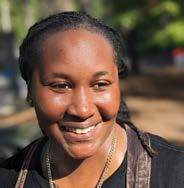
CONCHETTA
Fayetteville
“Do I think therapy is good? Yes. Do I believe black people need therapy? I do. I believe everybody needs therapy. Therapy is a good outlet. It's a way for people to express themselves without getting any criticism or anybody judging them. And actually, it's a way to have someone help you cope with whatever issues you're going through. I think it's good. It's a good release. A good way to get yourself situated if you need some help to get your life in order.”

“I feel like it's very much needed, especially in my community where we deal with a lot of crap, a lot of poverty, a lot of trauma, and a lot of gun violence. I mean, there's a lot of negativity to me. I'm 44 years old, and just from my upbringing, man, I have witnessed over 300-400 kids that have died, and so, you know, I'm traumatized myself. I definitely know I need to be in some therapy just for the line of work I do. I'm a Violence Interrupter for an organization called Cure Violence Atlanta.”

“I feel like therapy is necessary for everybody involved with any trauma. I think it's not just something for white people, young people, or older adults. It's something anybody can use to work through any issues, move forward in life, and live a happy life.”

BY DONNELL SUGGS
Journalism has the ability to connect millions of Americans and billions of people across the world. Sometimes that reach can simply be a few miles down Peachtree Rd.
The Office of the Consulate General of Japan and Atlanta’s one and only Blackowned and operated newspaper, The Atlanta Voice, may not seem to have many things in common, but in fact, they do. Both entities are preparing to celebrate milestone anniversaries of representing their respective communities.
On Monday, Aug. 12, two representatives from the Consulate General of Japan visited The Atlanta Voice headquarters in the Mechanicsville section. Their visit marks the first time a foreign consul has stepped foot into The Atlanta Voice office under publisher Janis Ware's current regime. Deputy Con-
sulate General of Japan Hiroyuki Kaneda and Political, Economic, and Cultural Adviser Ike Chi made their way into the office to meet with the publisher, editor-in-chief, and support staff.
Though the discussion was private, the meeting was definitely one to mark for the history books. Both men were given a tour of the office and some of the framed historical front pages of The Atlanta Voice, including coverage of Atlanta’s first Black mayor, Maynard Jackson, and its first female mayor, Shirley Franklin, and the passing of luminaries such as Congressman John Lewis. Kaneda said he wanted to “express gratitude to the people of Georgia” and thought it was only right to do that through the 59-year-old The Atlanta Voice. All parties agreed to have future audiences with Ware, including at Japan Fest Atlanta at Gas South Arena on Sept. 21-22.
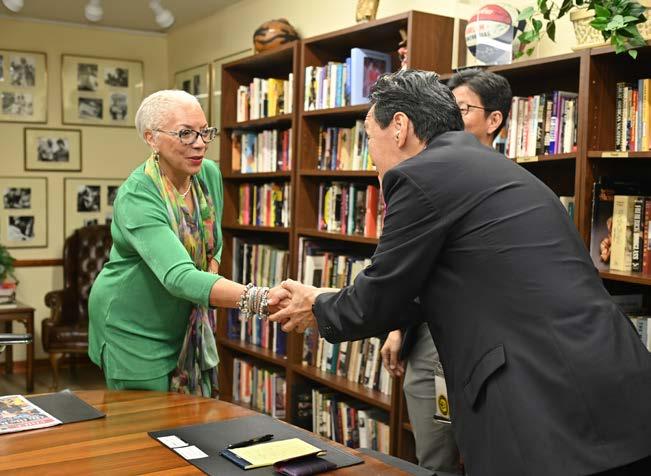

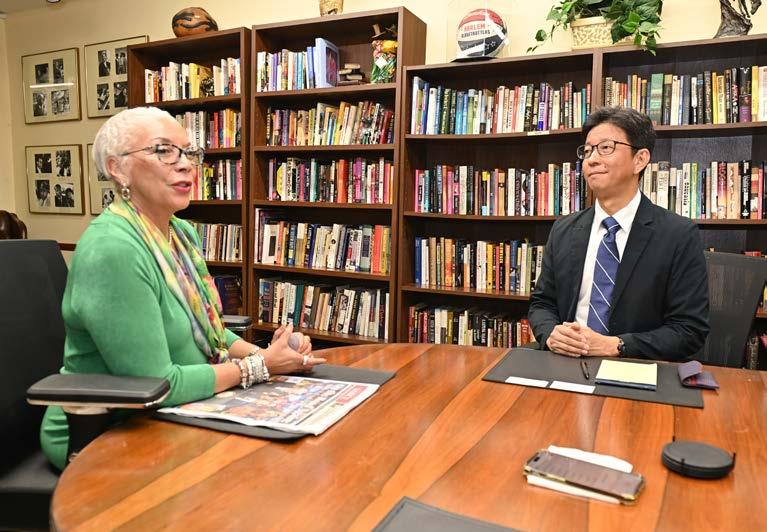
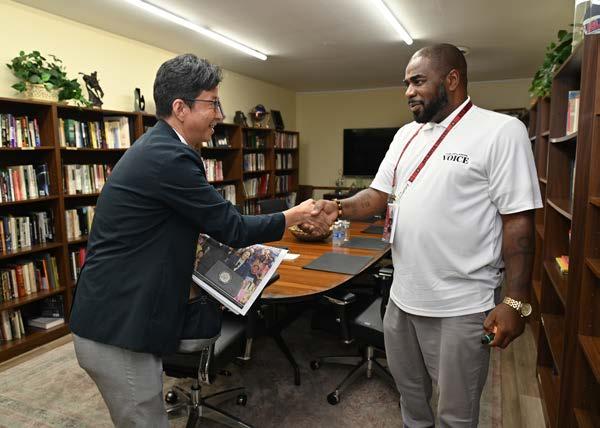
BY DONNELL SUGGS
Atlanta Mayor Andre Dickens has picked Rocsean Spencer to lead the City of Atlanta’s Office of Contract Compliance (OCC). In an interview with The Atlanta Voice on
Monday afternoon, Dickens told the Voice that Spencer was selected after a national search.
“She has the experience; her whole career has been about providing diversity and equity,” Dickens said. Dickens added that Spencer, a wife and mother of
three adult children, has ensured small businesses have gotten a good shot at city contracts. Most recently in stints as the inaugural Chief Diversity Officer and Small and Emerging Business Program Director for the New Orleans Ernest N. Morial Convention Center.
Spencer holds degrees from Historically Black College and University (HBCU), Morgan State University, and Southern University in New Orleans.
The OCC, which started during the groundbreaking Maynard Jackson administration, is de -
signed to help small Black-owned and female-owned businesses secure formal contracts with the City.
“It’s a special office designed to provide opportunities for contracts in the city’s various departments,” Dickens said about the OCC, which he calls one of the greatest. On Spencer, he added, “She is going to do an excellent job.”
Some departments that will be available for OCC-related contracts are the City’s aviation, watershed, and general fund departments.





BY NOAH WASHINGTON
The powerful and poignant smell of popcorn was overpowered only by the excitement radiating from the Boyce L. Ansley School students.
On Friday, August 9, the Boyce L. Ansley School—a tuition-free private institution dedicated to serving children who have experienced or are currently experiencing homelessness—partnered with Comcast for an Olympics-themed field day. The event featured various activities, such as basketball, Connect Four, and egg and sack racing. The games were scheduled to provide a break for the students at the beginning of the academic year.
For Ileana DeJesus, known affectionately as "Miss DJ," this day held particular significance. DJ has been a third-grade teacher at the Ansley School for three years.
"Our students often carry more responsibility than a typical child," DeJesus said. "When they're laughing and playing, they just actually get to be kids for this moment.”
"These are all our children, and we will all profit by or pay for whatever they become," recited Ray James, Head of School for the Boyce. L Ansley School. James is entering his second year at the helm and recited that James Baldwin quote when speaking about his students’ conditions. The quote is timely, coming one week after the 100th anniversary of Baldwin’s birth.
As the school year begins, James has clear hopes for the students. He wants them to start the year with joy and carry that momentum forward. "When we start doing assessments next week, I want them to go in with some energy and momentum of joy," James explained. This focus on joy is not just about making school fun; it is about fostering a positive mindset that will help students navigate the challenges they face both in and out of the classroom, he said.
Kamryn Sprewer, in her first year at the Boyce L. Ansley School, joined after a conversation with Ray James, who emphasized the importance of prioritizing learning. "This is a space where not only are we doing something for the greater good of our community, but we're also prioritizing learning," Sprewer said, "This was exactly the professional environment I needed."
In her second-grade classroom, Sprewer ensures that her students experience an equitable education, free from the burdens of their outside realities. "The beauty of the Ansley School is that in this classroom, it is equitable. Our students deserve all the things that every kid gets—quality education, support, and a space just to be kids," Sprewer added. Sprewer also ensures that her students know the importance of social-emo -

tional learning, starting each day with emotional discussions.
The event occurred in Marietta at the Girls Inc. of Greater Atlanta gymnasium. The day was more than just fun and games; it was an opportunity for the students to experience joy and community at the start of the school year, which is crucial for their emotional and academic growth, cited James, “When students are more confident and happy, they perform better,” James shared, emphasizing the connection between emotional well-being and academic outcomes.
Mike McArdle, the Regional Senior Vice President of Comcast’s Southern Region, was present for the field day and announced that every child would receive a brand-new laptop. This moment sent the students into an excited frenzy. “It gave me chills,” McArdle recalled, praising Ray James and his staff for their dedication and noting the students' excitement and the positive atmosphere they helped create.
The laptops donated to the students are part of Project UP, Comcast’s $1 billion initiative to advance digital equity and economic mobility

in communities across the country, including Atlanta. “ I've been with a company for almost 30 years, starting as a frontline employee, and we've always looked to invest in the communities we serve,” McArdle remarked. Looking ahead, James has ambitious goals for the school year. He aims to improve the school’s ability to measure the impact of its social services, tracking progress in areas such as housing stability, transportation access, and job development for families. Academically, he is focused on collecting more robust data to provide a fuller picture of each student’s growth, emphasizing skills related to the school’s core values rather than just traditional academic metrics.


BY ERINN GARDNER
DTU Intern
Vivo brought a touch of Kenyan elegance to Atlanta with the opening of a new store at Atlantic Station on May 22. Women of all demographics look forward to a unique yet stylish selection of apparel, accessories, beauty products, and home goods, all meticulously designed and crafted in Kenya.
“It’s a modern take on contemporary African fashion. One of our selling points is to provide affordable and stylish options for ladies who want to look good without breaking their bank,” Vivo U.S. Business lead Michelle Gatonye said.
In 2011, Wandia Gichuru and Anne Marie Burugu founded Vivo in Nairobi with intentions of producing all items in Kenya in order to offer local African women quality clothes for affordable prices. A bulk of apparel stores in Kenya frequently import products internationally. Not only do these stores sell for high prices, but the clothes tend to not compliment African skin tones and body sizes.
Gichuru practiced yoga and her children pursued ballet, but she faced difficulty in finding appropriate attire. This challenge sparked her business idea of selling dance attire at Vivo. However, the fitness market was not big enough, inspiring her to incorporate everyday yet stretchy and vibrant clothing to the mix. Customers were happy with this young and modern look, so Gichuru decided to further expand.
Fast forward 13 years, Vivo has 27 locations: 23 in Kenya, two in Rwanda, one in Uganda and one in Atlanta with about 450 employees total. Taking into consideration the climatic conditions, economic factors and the significant presence of the Black community, establishing a Vivo store in Atlanta proved to be the optimal move for the brand.
The store’s inclusivity not only appeals to the average woman, but it will also likely garner support from nearby HBCU students, including those from Spelman and Clark Atlanta University.
Vivo constantly demonstrates their support for other Kenyan women-owned brands by
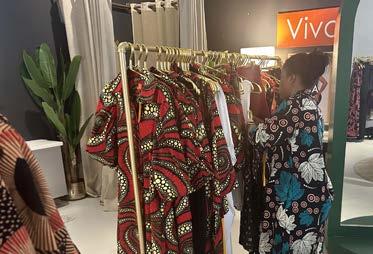
retailing their products in the Atlanta store. Because expanding to another continent is an immense risk, Vivo has allowed lifestyle brands such as Soko, Angriu and Ythera to test the waters in the U.S. economy. These brands sell goods ranging from handcrafted jewelry to skincare products.
With Kenya’s unemployment rate of 40%, Gichuru aims to create jobs for individuals. A handful of Kenya residents study fashion de-
sign, but are unable to secure jobs due to the high number of fashion brands importing their clothes. With clothing designs varying on the store location, Vivo has a high demand for fashion designers.
“This has been so rewarding for me because we’ve been able to create jobs for so many people. A lot of people in Kenya study fashion design, but can’t apply their skills. The impact that we are making in the broader ecosystem has been the best part for me,” Gichuru said.
While universities in Kenya often lack investment in new technology, Vivo distinguishes itself by doing so. This approach attracts numerous interns, aspiring fashion designers and future entrepreneurs to work for Vivo hoping to gain insight.
“I’m a double major in fashion and finance at Virginia Tech, so I came here with hopes to grow my knowledge in the fashion world and learn about entrepreneurship. I’m interested in starting my own business, so I’ve been looking into the operations and behind the scenes of everything,” store associate Chris Magaro said.


Project 2025 is Donald Trump and JD Vance’s plan to remake the federal government if they win. It would:
Use Civil Rights-era laws created to address discrimination to instead benefit white people – Axios, 4/1/24
Gut the Affordable Care Act, which will raise health care costs and threaten health care coverage for millions of Americans – AP News, 11/27/23
Cut Social Security and Medicare Americans have earned – Washington Post, 2/9/23
Ban abortion nationally – New York Times, 2/16/24


BY DONNELL SUGGS
Under the image of one of the South's greatest Civil Rights Era icons, the late Congressman John Lewis, a number of Georgia politicians and Harris/ Walz campaign surrogates spoke to assembled media and supporters on Thursday afternoon. The goal was to continue the positive momentum of the campaign in Georgia ahead of the pair's first visit to the state. A campaign stop in Savannah was postponed due to Hurricane Debby and concerns over the weather in coastal Georgia. Harris held a large rally at the Georgia State University Convocation Center in Atlanta last week, just days before selecting Walz, the Governor of Minnesota, as her running mate.
Georgia State Rep. Saira Draper, Georgia State Senator Harold Jones II, North Fulton County Democrats Chair Dontaye Carter, and Tolulope Kevin Olasanoye, the executive director of the Georgia Democratic Party, all took turns speaking about the dangers of another presidency under former United States President and current Republican presidential nominee Donald J. Trump.
Olasanoye said he and the politicians were there because the Georgia State Election Board had forgotten what it was supposed to be doing. This comes after the Board decided to pass a new rule allowing county boards to request more information before certifying election results. Many see this as a preemptive stalling tactic by a GOP-led board.
"It is very, very clear that there are members of the State Election Board who are doing the bidding of Donald Trump," Olasanoye said. "They are trying to rig the game before it starts."
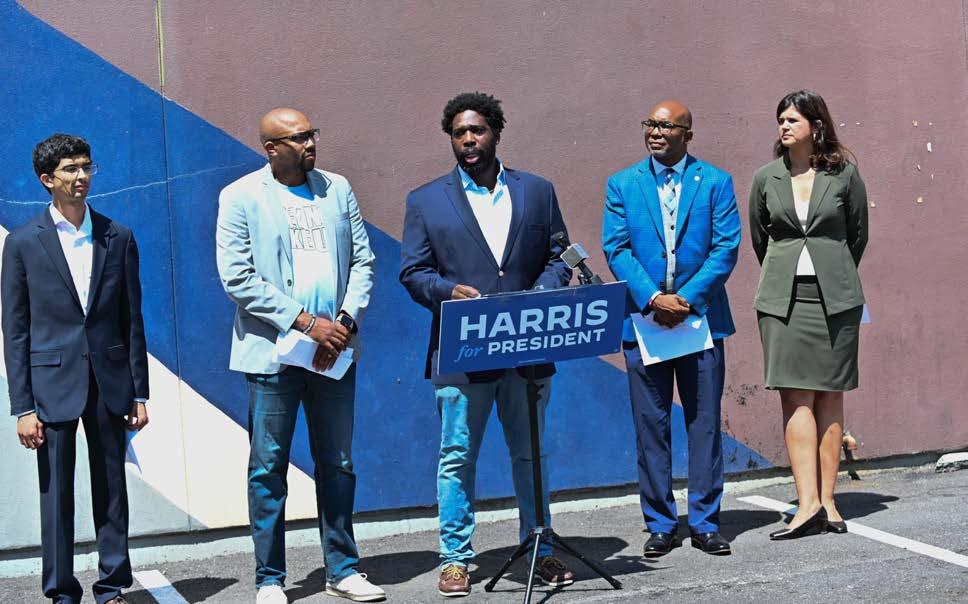
Olasanoye believes the energy from the large crowds at rallies around the country, particularly and most recently in Atlanta, is a good sign, but it cannot be seen as a sure bet for Democrats. "Good feelings alone are not going to get us over the finish line," he said.
"We will continue to fight," Draper added. "Georgia Republicans are trying to make it harder to vote, but they will not succeed."
All of the speakers, including North Fulton Democrats Chair Dontaye Carter, made sure to mention that the Trump/Vance campaign was running out of things to say and, thus, resorting to the negativity that Trump is more famous for. Voting in record num-
bers, which Georgians did during the last presidential election 2020, can go a long way to keeping the state and its 16 electoral votes blue/purple.
Carter said he had a message to Georgians who are thinking of not voting or don't know why they should vote this time: You must vote.
"For people of Georgia, the fight ain't over," Carter said. "We have to get our souls to the polls."
Early voting in Georgia begins on Tuesday, October 15. The deadline for voter registration is Monday, October 7.
"Women take care of the family, the home, the family. Why not the world?" said Jamal
BY DONNELL SUGGS
With less than a week until the start of the Democratic National Convention in Chicago, the DNC will launch a series of billboard advertisements contrasting its opponents, the Trump/Vance ticket, and its message.
According to the DNC, this is the first paid media launch with both Harris and Walz on it. There will be 13 billboards in Atlanta, Macon, and Savannah, three of the state's most populous voting markets. There will also be a national push with 80 billboards across several battleground states.
The Harris/Walz presidential ticket made its way across the country last week. The sitting United States Vice President and Governor of Minnesota took their "joyful warrior" tour to Michigan, Wisconsin, Pennsylvania, and Arizona on Friday. The ticket had to postpone a
scheduled rally in Savannah last week due to tropical storm Debby, but they will be in Georgia this week—sort of.
The four Atlanta billboards will be located on I-85 at Frontage Rd., on either side of I-85 at Exit 86/Buford, and at the 528 Plasters Avenue exit.
In Macon, the advertisements will be located on I-75 near Exit 165, on Coliseum Drive, and at the intersection of Eisenhower Pkwy. and Log Cabin Dr.
The majority of the 13 advertisements in Georgia will be in Savannah, where there will be seven in total, including at the intersection of I-16 and Chatham Pkwy., at the corner of East President St. and Goebel Rd., and I-95 before Exit 102.
The advertisements will be in both English and Spanish, according to sources close to the campaign.
Omar Tenker, a Democrat and Harris/Walz supporter.
While the press conference continued, people drove by and beeped their horns, and others walked by, some shouting "Kamala Harris.” Voters like Jamal Omar Tenker walked by several times during the press conference. He said he was looking forward to Election Day.
"We say it all the time: behind every successful man is a woman. Well, now put her in front," Tenker, a Democratic voter, said as he stopped by the mural to look on. "Women take care of the family, the home, the family. Why not the world?" he asked.


BY DONNELL SUGGS
ASHEVILLE, N.C. - Thousands of supporters waited in a long line in the sun to see former United States President Donald J. Trump and his vice presidential nominee, Ohio Senator J.D. Vance speak at a rally stop in downtown Asheville on Wednesday afternoon. Many would have to wait for another opportunity to see Trump and Vance because Thomas Wolfe Auditorium, located inside Harrah’s Cherokee Center, has a capacity of just 2,431.
Trump, the current Republican presidential candidate, was scheduled to hit the stage at 4 p.m. People had been waiting in line since before noon that afternoon. Awaiting the 45th president of the United States on stage that afternoon were two big signs that read, “No tax on Social Security” and “No tax on tips.” Both issues have been campaign staples for the Trump/Vance ticket, the latter becoming a part of the Harris/walz talking points since being made public in Nevada over the weekend.
Chants of "We love Trump" and "USA, USA, USA" greeted Trump, who stood and watched feet from the dais when he took the stage. It only took him two minutes to start bad-mouthing current presidential opponent Kamala Harris, calling her "crazy" , a "socialist lunatic," and making fun of her laugh, former opponent Joseph R. Biden and current vice presidential candidate Minnesota Governor Tim Walz, calling him a "clown".
"They are a threat to democracy," he said of the current President and Vice President of the United States. "Can you imagine, 83 days from now, we're almost there. We're going to defeat Kamala Harris, and we're going to win back the White House."
Trump added that he doesn't think that Harris can't win this election. "We're going to beat her and maybe they will find another candidate," Trump said. "I personally don't think they will do well."
The economy was the first topic he started with, stating that "they say the economy is very important right now" and that the country is currently a "banana republic."
He made statements about rebuilding the "American Dream", inflation, and lowering taxes and prices of food.
"The Harris price hike has cost the typical American household $20,000," Trump said. He asked the crowd if they were better off financially with him out of the White House. "We'll bring back the American dream bigger and better than before," Trump said.
During his speech, Trump mentioned that a number of foreign dictators were friendly with the United States under his administration. He also insisted that he would reduce government spending, lower taxes, upgrade border security, and become totally energy-independent as a country.
Before Trump took the stage, several speakers testified about how life was much better when Trump was in office. Glenda Wilson, a 73-year-old retired juvenile counselor, spoke about being able to pay her bills
and save money under the Trump administration. She said she might have to move in with her adult children because of the high costs.
“I want to live in a Trump America again,” Wilson said. “The current administration cares nothing about how we live.”
Retired law enforcement officer and restaurant owner Jeff Willis echoed Wilson’s concerns and added that his business was also better off when Trump was president. Neither he nor Wilson mentioned Vance during their five minutes on stage.
North Carolina Congressman Chuck Edwards, Senator Ted Budd, who did mention Vance as a friend and colleague, and Lieutenant Governor Mark Robinson all took turns speaking about how Trump needs to be sent back to the White House. Robinson, who is in a tight race with Josh Stein for the state’s top seat, went as far as to say that the Republican Party has an obligation to help get Trump back in office.
“The Republican Party is the party that will make North Carolina great again,” added Robinson, who said he and his wife have been harassed for their political views.
“People should be able to work and run a business without fear of reprisal from their government,” he said.
Other than a campaign stop in Montana last week, he hadn’t been on the campaign trail in a week but did speak to the media at Mar-a-Lago Club in Palm Beach, Florida. Another press conference is scheduled for Bedminster, New Jersey on Thursday, a day be -
fore the Harris/Walz campaign makes its way to Raleigh for one of its last campaign rallies before the Democratic National Convention in Chicago next week.
The Trump/Vance ticket was in Atlanta earlier this month, and Vance is scheduled to deliver remarks in Milwaukee, the location of the Republican National Convention, on Friday, according to the campaign. Wisconsin, Michigan, Pennsylvania, and to a certain extent, Georgia and North Carolina, are still in play as battleground states.
Prior to the rally in North Carolina, the Trump campaign had to pay the City of Asheville $82,247.60, including a fee of $22,500 for renting Thomas Wolfe Auditorium. In anticipation of the rally, which was announced on the city’s website, several road closures were announced.
Trump was recently released from Twitter jail by Elon Musk and co-hosted a Spaces with the South African billionaire for more than two hours on Monday.
Democratic vice presidential pick Tim Walz, the governor of Minnesota, took to the campaign trail beginning on Tuesday in Los Angeles. Walz, best known as a purveyor of joy and doing for your neighbor while on the trail with United States Vice President Kamala Harris, also crisscrossed the country, visiting Newport Beach (CA), Denver, Boston, Newport, Rhode Island, and Southampton, New York. The Harris/Walz ticket recently spent ad money in Georgia, debuting new billboards on major highways in Atlanta, Macon, and Savannah.

BY ISAIAH SINGLETON
years and one day after the signing of the historic Voting Rights Act of 1965, Faith Works, Georgia's unified body of faith leaders fighting to promote the vote and voice of all African American voters, joined together at the Rev. Martin Luther King Amphitheater (between the historic Ebenezer Baptist Church and the Ebenezer Baptist Church: New Horizon Sanctuary) on Wednesday, August 7.
The purpose of this rally was to unite with elected leaders, press, voting advocates, and other faith leaders from across the state to outline the reality and consequences of Project 2025, provide broad statewide GetOut-The-Vote plans, and respond to recent efforts by the Georgia Board of Elections regarding the certification of election results.
Faith leaders throughout Georgia launched Faith Works in July 2022 in response to various voter suppression tactics throughout the state and to promote the vote and voice of all African American voters.
After a record turnout by African American voters in the 2020 election, extremists in Georgia constructed and spent millions of dollars on a campaign designed to minimize and invalidate various communities throughout the state from voting, most specifically, voters of color for this year's election.
The event was led by AME Georgia Bishop Reginald Jackson, Rev. Dr. Cynthia Hale, founder and Senior Pastor of the Ray of Hope Christian Church; Rev. Timothy McDonald, III, Senior Pastor of the First Iconium Baptist Church, founder of the African American Ministers Leadership Council, and more.
Bishop Jackson said America’s democracy is at risk, and every time former President Donald Trump opens his mouth, it’s “ignorance and lies.”
“Every time Donald Trump opens his mouth, he proves his ignorance and lack of sincerity about uniting the nation,” Jackson said. “Donald Trump is a spoiled, petulant, narcissistic punk who craves attention even though he makes no sense.”
Furthermore, Jackson said Trump believes everything is centered around him, and it’s alright when Trump doesn’t tell the truth, but it's an issue when everyone else tells the truth.
“The truth is offensive to him. He’s already trying to suspend the Constitution and has already stated he wants to be a dictator. He’s already stated that he intends to deport all the immigrants in this country, whether they are illegal or not, so we’ve got to put the choice before this election,” he said.
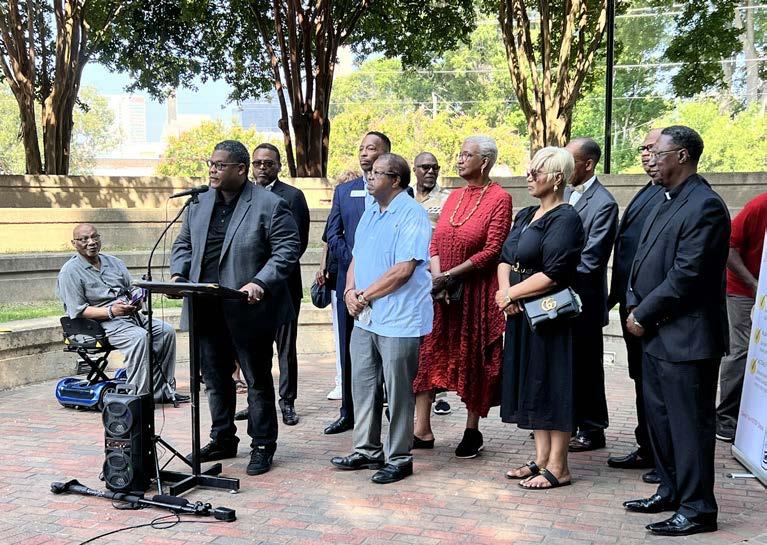

Jackson further said Trump is showing all the signs of “a scared child, and his daddy is not there to save him.”
“In his hour of desperation, he is going back to his old playbook of race-baiting, birth certificates, and saying anything that will get him back into the news cycle. In a last-minute flip-flop, he is even now trying to retreat from Project 2025, but we don’t believe the hype, and we’re going to say that loud and clear,” he said.
Additionally, Jackson said every time
Trump opens his mouth, it’s a lie, even as far as Project 2025, in which he said, “he’s against it but doesn’t know anything about it.”
If [Trump] knows nothing about it, how can he be against it? Jackson said that his administration wrote the project and wanted us to believe that if he were elected, he would have nothing to do with it.
Also, Jackson said they must continue to send a message and ensure the upcoming November election is fair, has integrity, and
is certified. He also emphasized the importance of the role of black faith leaders.
“It’s up to us to make sure the truth is told, it’s up to us to make sure this nation is not divided any more than it already is, and it’s up to us to ensure our mission for the American people is discussed,” he said.
Reverend Timothy McDonald said they know they won’t be able to change Trump and will not waste their time trying.
“We want the African American community and the American people not to be fooled by his lies,” McDonald said. “We will spell out to Georgia and the nation what his policies have and will do to this country. We must not, better yet cannot, let his sad vision of hate and division destroy our future.”
The anchor of this effort was Georgia's new anti-voting law, SB 202, which passed without debate or discourse.
SB 202 significantly diminishes the ability to request and submit absentee ballots, minimizes voting opportunities across the state, makes it a crime to offer food or water to people waiting in long lines to vote, and places the politically controlled legislature in control of the State Election Board, rather than the elected Secretary of State.
“They want to change the rules again and do anything that will ensure that Donald Trump wins Georgia; we’ve got to send a message,” he said. “We’re not going to stand by and let this happen, and we have to make it clear that whatever it takes, we’re going to make sure this election is fair.”
Jackson said they’re making it even easier to challenge people’s right to vote.
“They’re trying to even now make it harder to do early voting and use drop boxes and make it easier to challenge people’s right to vote,” he said. “Why is no one investigating Coffee County, and why has no one been charged?”
Jackson also said we’ve got a job to do, and young people are now excited about Harris becoming the democratic party nominee.
Jackson said that winning in November would take a collective effort.
“We must continue to push our Black women, young black individuals, especially Black men to go out to the polls in November and vote for democracy [Kamala Harris]. We cannot go back because this man is violent, dangerous, and right-winged,” he said. “Also, check your voting status; even if you’ve consistently voted, they are trying to manipulate this election.”
Lastly, Jackson said that as Black people, we are adaptable, so no matter what we are put through, we will adapt and come out stronger.
To learn more about Faith Works, visit FaithWork.Vote. For more information on Project 2025, visit https://shorturl.at/eQZkP.

The African American Male Wellness Agency recently announced its annual Atlanta Black Men’s Wellness Day, which will be held on Saturday, September 14, at 7:00 AM at Morehouse College Public Health Sciences Institute, 830 Westview Drive, Southwest Atlanta, GA 30314.
For the past five years, Black Men’s Wellness Day Atlanta has been an annual event featuring a 5K walk/run and health screenings for Black men. The goal is to get as many Black men as possible to participate in free onsite health screenings that measure their blood pressure, blood sugar, cholesterol, HIV, STD/STI, prostate cancer, and more.
“We do this every year to save the lives of Black men,” said Keith Dobbins, the Atlanta Coordinator for African American Male Wellness Agency Atlanta. “If you save a Black man’s life, you save his family. When you save the family, you save the community. And that’s what we’re all about, affecting massive change through the
health of Black men.”
For the 2024 Atlanta Black Men’s Wellness Day, Greg Clay, City of Atlanta Executive Director, Mayor’s Office of Constituent Services, serves as the 2024 Honorary Chair.
“I am extremely excited to lead this annual effort here in Atlanta as we work to impact health disparities, along with other issues, in my role with the city daily,” Clay said. “This proactive movement is a true depiction of Atlanta’s Group Project, working together to fight our community’s biggest challenges facing Black men.”
Also, serving as local Atlanta ambassadors for the 2024 Atlanta Black Men’s Wellness Day are:
• Georgia Rep. Derrick Jackson (District 68)
• Georgia Rep. Eric Bell, II (District 75)
• Tony Terry, R&B recording artist
• Ovie Mughelli, former Atlanta Falcons healthcare consultant
• Rafiq Ahmad, former president of 100 Black Men of South Metro Atlanta
• Merlin Knight, vice president, Greater South Fulton Chamber of Commerce
• Jared C. Fields, chairman Mirror 100 Mentor-
ing Program of 100 Black Men of South Metro Atlanta
• Dr. Parion Alexander, Board Certified Physician Assistant, The Family Health Centers of Georgia
• J. Levesnton Bell II, vice president of mental health & wellness, The AON Initiative
• Langston Longley, Principal, Scott Elementary School
• Hamilton Abbott, youth ambassador Last year, Black Men’s Wellness Day attracted over 1,500 people who received free health screenings and participated in the festivities. Morehouse School of Medicine is returning this year as a partner to conduct the health screenings.
“Black Men’s Wellness Day in Atlanta is more than just an event- it’s a movement toward health equity and empowerment for African American men,” said Kenny R. Hampton, president of the African American Male Wellness Agency. “By addressing the health disparities that disproportionately affect our community, we are improving individual lives and strength-
ening families and communities. Our mission is to provide the tools and resources necessary for Black men to lead healthier, longer lives, and this event is crucial to making that vision a reality.”
Since 2004, The National African American Male Wellness Agency (The AA Wellness Agency) has produced a 5K Walk & Run in over 15 cities as an awareness campaign to spotlight the fact that Black Men die on average 12 years earlier than their white counterparts. For 20 years, the AA Wellness Agency has worked to save Black men’s lives, close the health gap, and help Black men live longer from preventable diseases.
In addition to the 5K walk/run and free onsite health screenings, The 2024 Atlanta Black Men’s Wellness Day will also feature live entertainment and family-friendly fun, which includes an area specifically for kids.
Sponsors for the 2024 Atlanta Black Men’s Wellness Day include Johnson & Johnson, CareSource, Genentech, Kaiser Permanente, Kroger Delivery, Care Access, and Inside Edge Consulting.
For more information about African American Male Wellness Agency, visit https://aawellness.org/.


BY STAN WASHINGTON
It was 50 years ago when Atlanta, the capital of the New South solidified its reputation of being “The Black Mecca”. That is when the charismatic wavy head vice mayor Maynard Jackson was sworn in as the city’s first African American mayor.
Award winning author and playwright Pearl Cleage who was Jackson’s first press secretary is paying tribute to her former boss in an Alliance Theatre production of “Something Moving: A Meditation on Maynard Jackson” Aug. 3 -11.
“I really wanted to do a piece that used the memories that I had of how exciting it was, how exhausting it was in just making it work in a way that is just so different,” Cleage said during a phone interview. “This was like a big transitional moment and the things that we were trying to do we never had a chance to do before.”
A graduate of Morehouse College and the
descendent of prominent black Atlantans, Jackson had survived a nasty mayoral campaign launched by the city’s first Jewish mayor Sam Massell. Elected with the help of black voters, Massell was not ready to give up the mayor’s office after only one term. He ran a highly negative campaign titled: “Atlanta: The City Too Young To Die” which implied that if a black mayor took over the reins, the white resident flight would be followed by the white downtown business community which included the likes of Coca-Cola, Rich’s department stores, Citizens & Southern Banks, Southern Bell and others.
The campaign infuriated the black community and Massell lost nearly all of his black support to Jackson. The campaign backfired and Massell would never hold public office again.
The facts, the date and the analysis of what happened during that historic election room is well-documented. What Cleage

is trying to recreate with the play are the feelings people were having during that period.
“Once I thought about it I asked myself: What do I remember about that time? What did it feel like to be there at that time? When I worked for him I was always trying to get him to sit down and talk to me on tape about what happened this week, what did it feel like when this happened? I kept telling him that you will remember the facts of what happened, but you won’t remember what it felt like to be there,” she said
“ He was reluctant to do that because I think he felt like that it would have exposed a level of vulnerability that he didn’t want to really explore. He had to be the mayor and do all the things that mayors have to do,” Cleage said.
Black Atlantans and progressive whites would not feel that kind of euphoria behind electing its first black mayor until the nation elected its first black president.
The play debuted last year in Washington, D.C., and was produced by the Ford Theatre, which had commissioned pieces on historical figures by playwrights.
“ I always felt like this is a play I want to give to Atlanta. I wrote this for Atlanta people, to be done by Atlanta people in front of Atlanta people. Because it really was a moment when we did something great. I wanted people to remember that democracy does work when you elect a good person who is committed to doing good things –that it works,” Cleage said.
“Added Cleage: “The piece (play) came out of wanting people who were there to have a moment before we all join the ancestors to say, yes, that was a great moment, and we remember it, and for people who weren’t there and the young people who are in Atlanta now and who don’t really understand what that moment was like to have a chance to look at it and to see what it kind of felt like.”






BY DENNIS MALCOLM BYRON AKA ALE SHARPTON
As the welcomed trend of all-electric automobiles continues to build, so does the innovation to make them more exciting, powerful, and attractive. The 2025 Ioniq 5 N Hyundai checks all the boxes and then some.
When the “N” badge is associated with the trim for any of this carmaker’s models, the auto industry is alerted that power and a thrilling ride follow with the goal to wow especially racing enthusiasts. The bonus is this model still maintains the comfort and roominess of the more practical Ioniq 5 from the 2022 generation’s launch; the N just possesses a demon under the hood.
While the cubic body, futuristic lighting, 21-inch alloy wheels, and “Soultronic” orange will collectively turn heads, let’s get straight to the excitement hiding behind the wheel. Minus the roars of what traditional gas-guzzling muscle cars produce, this EV is a silent

assassin. Powered by dual high-performance electric motors, the Ioniq goes 0 to 60 mph in just over three seconds, plus a mind-boggling 601 horsepower and 545 lb-ft. of torque. And as if that’s not enough, the steering wheel has the automaker’s signature boost button, taking this SUV to a reportedly 641 mph. With all this power—plus paddle shifters, metal pedals, and shift-by-wire gear selection to make things even more interesting—the handling is enhanced with all-wheel drive and electronically controlled suspension. The driving range is 221 miles and takes about 8.7 hours to charge.
As the welcomed trend of all-electric automobiles continues to build, so does the innovation to make them more exciting, powerful, and attractive. The 2025 Ioniq 5 N Hyundai checks all the boxes and then some.
When the “N” badge is associated with the trim for any of this carmaker’s models, the auto industry is alerted that power and a thrilling ride follow with the goal to wow especially racing enthusiasts. The bonus is this model still maintains the comfort and

roominess of the more practical Ioniq 5 from the 2022 generation’s launch; the N just possesses a demon under the hood.
While the cubic body, futuristic lighting, 21-inch alloy wheels, and “Soultronic” orange will collectively turn heads, let’s get straight to the excitement hiding behind the wheel. Minus the roars of what traditional gas-guzzling muscle cars produce, this EV is a silent assassin. Powered by dual high-performance electric motors, the Ioniq goes 0 to 60 mph in just over three seconds, plus a mind-boggling 601 horsepower and 545 lb-ft. of torque. And as if that’s not enough,
the steering wheel has the automaker’s signature boost button, taking this SUV to a reportedly 641 mph. With all this power—plus paddle shifters, metal pedals, and shift-bywire gear selection to make things even more interesting—the handling is enhanced with all-wheel drive and electronically controlled suspension. The driving range is 221 miles and takes about 8.7 hours to charge.
Price: The 2025 IONIQ 5 N is $67,685 including options, handling, processing and delivery as reviewed.
For more information, visit Hyundaiusa. com.
Sealed proposals for 24RFP1320756A-BKJ - State Intergovernmental and Interagency Affairs Services for the Fulton County External Affairs Department, will be accepted by the Fulton County Department of Purchasing & Contract Compliance, electronically through Bidnet Direct at https://www.bidnetdirect.com/georgia/ fultoncounty, on Wednesday, September 11, 2024, no later than 11:00 a.m. local (Eastern) time on the stated date.
Proposers names will be publicly read at 11:05 a.m. on the stated due date via Zoom.
Proposal Bond: N/A
Scope of Work: Fulton County Government (“County”) The Fulton County Department of External Affairs is seeking proposals to provide State Intergovernmental Affairs Services; including identifying state funding for County priorities related to a range of county services. The detailed scope of work and technical specifications are outlined in the Scope of Work, Section 3 of this proposal document.
In order to obtain complete information about this solicitation, please click the link below where this document and supporting documents can be downloaded, https://www.bidnetdirect.com/ georgia/fultoncounty Fee: N/A
Term of Contract: 1 Year, 2 Renewal Options.
A Pre-Proposal Conference, will be held via Zoom on Wednesday, August 21, 2024 at 10:00 a.m., local time, to provide proposers with information regarding the project and to address any questions.
Join Zoom Meeting https://zoom.us/meeting/register/tJElcOmvrDgsH9bzW7cYO2hvHnD8eDTowitv Meeting ID: 958 7072 3652 Passcode: 777369
If you have any questions regarding this project please contact Brian K. Jones, Chief Assistant Purchasing Agent, at Email: brian.jones@fultoncountyga.gov. Fulton County reserves the right to accept or reject any or all proposals and to waive technicalities.
Our client is proposing to construct one (1) 70-foot monopole communications tower in Fulton County, GA. Tower #71208 will be located at railroad mile post 146.10, approximately 350 feet southeast of the intersection of Burtz St. NW and Felker Ward St. NW in Atlanta, GA 30318. WSP USA, Inc., on behalf of our client, invites comments from any interested party regarding specific location information and/ or the potential effects of the tower on historic properties. Comments may be sent to Kaylee Swords, 300 Wyandotte St. Suite 200, Kansas City, Missouri 64105, or by email at Kaylee.Swords@wsp. com. Comments must be received 30 days following published date.


Cisco Systems, Inc. is accepting resumes for multiple positions in Atlanta/ Alpharetta/ Lawrenceville, GA: Software Engineer (Ref#: ATL103C): Responsible for the definition, design, development, test, debugging, release, enhancement or maintenance of software. Telecommuting permitted. Business Architect (Ref#: ATL140C): Responsible for the identification and development of supply chain solutions to enable new business models. Telecommuting permitted. Business Analysis Manager / Business Systems Analysis Manager (Ref#: ATL153C): Analyze business requirement to configure rule management and define systems solution. Telecommuting permitted. Business Systems Architect (Ref#: ATL412C): Optimize operational efficiency and develop systemic process solutions. Telecommuting permitted. Technical Solutions Architect (Ref#: ATL321C): Meet with customers to provide overviews, demos, Bill of Materials (BOMs), Request for Proposal (RFPs)/ Request for Information (RFIs), and proof of concepts on the company’s Software-Defined Wide Area Network (SD-WAN) technology and product line. Telecommuting permitted and up to 30% travel may be required to various unanticipated locations throughout the United States. Please email resumes including position’s reference number in subject line to Cisco Systems, Inc. at amsjobs@cisco.com. No phone calls please. Must be legally authorized to work in the U.S. without sponsorship. EOE. www.cisco.com

















Together, these 10 HBCU students drive the summer internship of a lifetime with Black-owned newspapers
